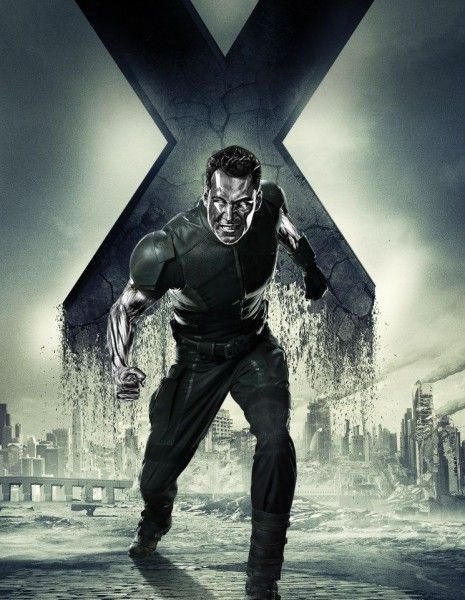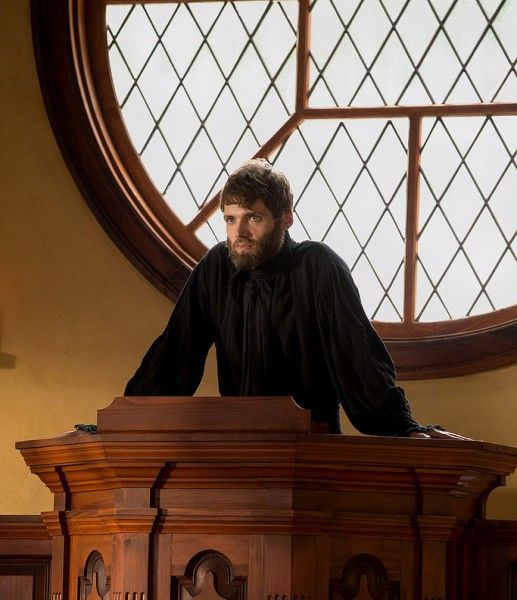Last Thursday’s 40th Annual Saturn Awards was a big night for genre filmmaking. Career achievement awards went to Bryan Fuller, Malcolm McDowell, Greg Nicotero and author Mac Cushman and new categories, including Best Performance by a Younger Actor in a Television Series and Best Comic-to-Film Motion Picture took the stage for the first time.
Collider was on the scene, hitting the red carpet to chat with established stars and up-and-comers alike. Our coverage continues with a triptych of interviews. First up is X-Men: Days of Future Past’s Colossus, Daniel Cudmore, who’s pushing The Legacy Virus as a sequel plot. Next up is Emmett Skilton, star of SyFy’s The Almighty Johnsons, who tells us about getting naked for the premiere episode. Finally, Seth Gabel explains why Salem is about misogyny and not an example of the same. Hit the jump for the full interviews and key quotes.
Daniel Cudmore:
0:10 - Question: Do you follow the comics? Do you know the history of the character, or did you learn when you signed on for the films?
DANIEL CUDMORE: I know bit and pieces, I mean, I did my research. I don’t follow along with the comics, but I’ve done my research enough to know who the character is, where he comes from, various story lines.
0:25 - How did they create your metallic skin?
CUDMORE: It was all reference CGI dots. And it was nice because it gives me the freedom to just act out the scenes how I want to and not have to worry about constricting makeup or constricting wardrobe or whatever it may be, prosthetics on my face. So, yeah. They do the scene and then they just paint over it all afterwards.
0:55 - Where would you like to see Colossus go?
CUDMORE: I’d like to introduce and start going down the story of the Legacy Virus and see that self-sacrifical part of him where he takes his own life to save his sister. I’d love to see that. But realistically, I don’t know if that would ever come along. We’re going down the whole Apocalypse road. And even in that, I don’t know if the character is going to be involved. So, we’ll see.
1:20 - Did any of the previous films happen, given the end of X-Men: Days of Future Past?
CUDMORE: That I don’t know. That I don’t know. I mean, that’s a good question. I have no idea.
1:40 - What’s the most difficult part of filming? Is it mostly CGI or physical?
2:05 - Would you most like to see more of Colossus in the past, present or future?
CUDMORE: I like the future. I enjoyed it. I liked the setting. I like the direness of that post-apocalyptic feel. It really brought out that side of the character who was basically fighting for his life and he’s basically losing fellow mutants left and right. So I’d really enjoy that. But who knows man? Whatever Simon Kinberg and the other writer’s come up with.
2:40 - Can you tell us anything about your upcoming projects?
CUDMORE: I can’t tell you anything about Warcraft because that’s ultra-secret and the contract they made me sign was huge. So, whatever all comes after that, I don’t know, we’ll see.
Emmett Skilton:
0:00 - Question: So, you’re here to promote a new show on SyFy that has not premiered here yet but is massive overseas?
EMMETT SKILTON: Yes. That’s true. It’s called The Almighty Johnsons and it’s about four brothers and their grandfather living together in modern day, and that all happen to be Norse gods. So, it’s made in New Zealand, produced in New Zealand, and exported most places overseas. And it’s told in a very unique way that America hasn’t seen before.
0:30 - Being very successful overseas and distributed all over the world, but now being in America where the show hasn’t come out yet, do you kind of feel a bit of a kinship with your character where he has this big important secret that nobody quite knows yet?
SKILTON: Yeah, I’d say that. In a way. I’d never thought about it that way, but absolutely. It’s about to be unleashed on the world in a way. Or at least this part of the world. So definitely a kinship, a little bit.
0:50 - how many seasons have you done?
SKILTON: Three.
Has SyFy purchased them all?
SKILTON: Yes. As far as I know, they have. And they start on the eleventh of July.
1:05 - Forgive me if this is a bit of an ignorant question but, is Weta working on any of the special effects? Because they’re the special effects house for fantasy things, that I know.
SKILTON: No. They’re generally at the moment doing films. We had our own, in-house special effects team working on it. But also, the special effects that we use aren’t necessarily Weta Workshop worthy. They’re not drastic, they’re not huge. The reason behind that is, the show doesn’t take itself too seriously. It’s something that could be relatable and in a way regular so that it doesn’t stand out too much from the crowd that it’s this crazy fantasy show. It’s grounded completely in reality with that science-fiction aspect threaded through it.
1:45 - Can you whet the appetite of potential viewers with one or two details?
SKILTON: I get completely naked in a forest. That might help. It’s part of the first episode. There’s a ceremony in the forest where my character finds out that he is, in fact, a god. And it involves nudity and lightening bolts and a lot of laughs.
2:10 - How do you get into character for getting naked in the woods and hit by lightening while discovering that you’re a god?
SKILTON: Getting into character wasn’t too much the priority considering that it was winter in New Zealand and I was naked in a forest. So it kind of just came with the territory. But in terms of getting into the character of Axl, he’s a very innocent, unknowing boy when we start the show. And it was my first major television role. So for me, in a way, I was experiencing something as major as Axl was, being exposed to this entirely new world.
Seth Gabel:
0:00 - General hellos.
0:20 - Question: There was a bit of controversy before the premiere of Salem over turning the story of women who were murdered for, basically, being women and turning it into a series where they actually were witches. How did you navigate that and did you have any uneasiness about it?
SETH GABEL: That perception kind of annoyed me and I think I got in some trouble for railing against some media types about that because that wasn’t what we were doing and it wasn’t our intent to exploit the suffering of innocent people or women. The concept of the show I think metaphorically speaks more to the truth about the oppression of women than we tend to discuss in society, or even in something like The Crucible. The Crucible is about McCarthyism, but I feel like Salem is actually about the oppression of women and how in a society, if you have too much overbearing male society, the repercussions are terrible and violent and awful. And so, what our show does is, it says that witches are running the trials and causing the mania and the hysteria that the overbearing male society has and [the witches] playing it against itself. And that causes innocent people to die. But in no way are we exploiting those people or saying that the real witch trials that happened, that the right people were killed. We’re saying, ‘No. It’s wrong on every level. But we need to look even further and see how we were wrong for oppressing women and having a society that tried to deny its natural instincts.’
1:50 - My alma mater is UCSB, and recently these issues have been very, very pressing in my life. How far can you expand that idea? Will the trial end? Or will they continue for the foreseeable future?
GABEL: We’re able to get into it. Adam Simon, who is one of the creators and the head writers and he and I have conversations all the time where we talk about things on a metaphorical, dare I say energetic level. And I feel like we really have a lot of space to explore the concepts of oppression, repression, male dominance, integration with the divine feminine. So, the witch trails went on for a little while. We’re taking our time in exploring that. But also, in season two we’re expanding a little bit. I think we might see a little bit of Boston, we might see a little bit of New York. We’ll see how these concepts played out throughout early America.
2:50 - In the upcoming episodes and the upcoming seasons, is there any chance that we’re going to see other types of historical stories about witch-like things? Like, the Biblical story of Lilith - who would cause women to miscarry if they didn’t obey their husbands - or anything like that? And can you tell us what any of them are?
It’s definitely possible. The people involved are looking at everything throughout history and I wouldn't be surprised if they went back to things that happened in Essex and all kinds of different witch stores and lore. I think nothing is off limits and we have the ability to do flashbacks all the time and see where these covens have come from and what the roots or origins were. I don’t know the specific stories you’re referencing, but I’m sure the people in charge do.



